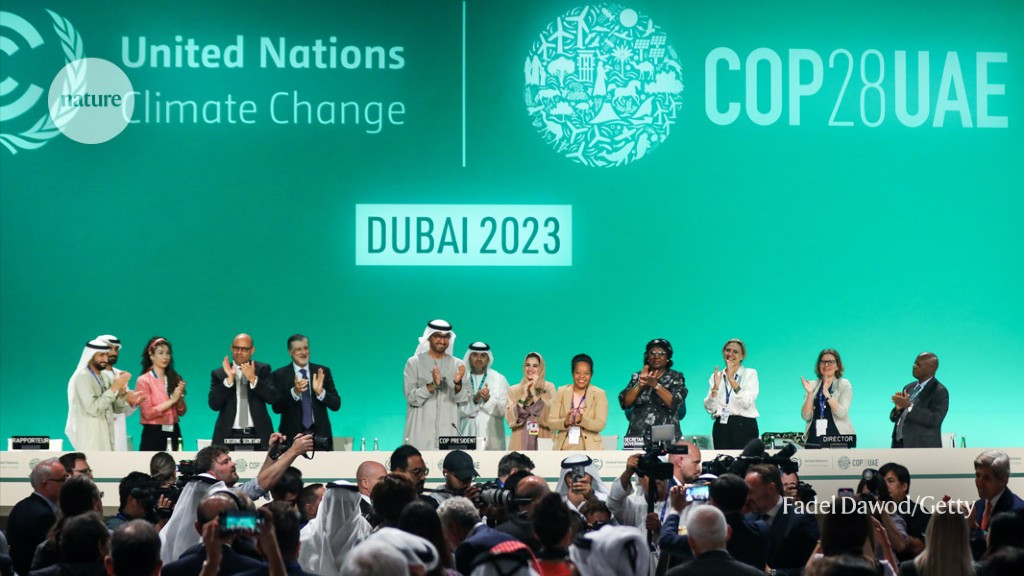COP28 climate summit signals the end of fossil fuels — but is it enough?

Nations make historic pledge to 'transition' energy systems away from fossil fuels — some scientists are disappointed by the softened wording

Delegates applauding at the end of COP28 in Dubai.Credit: Fadel Dawod/Getty
Scientists have voiced mixed reactions to a pledge to “transition away from fossil fuels” made by the world's governments at the end of the COP28 climate summit in Dubai.
“It’s major,” says Lisa Schipper a developmental geographer at the University of Bonn, Germany. Previous end-of-COP declarations have failed to mention fossil fuels in this way — at COP26 in Glasgow, delegates pledged to “phase down” unabated coal, which was regarded as a first at the time.
COP28 is the first global stocktake after the 2015 Paris Climate Agreement (COP21) in which representatives of more than 190 countries pledged to limit global warming to within 1.5 ºC degrees of pre-industrial levels.
The final COP28 text calls on parties to be: “Transitioning away from fossil fuels in energy systems, in a just, orderly and equitable manner, accelerating action in this critical decade, so as to achieve net zero by 2050 in keeping with the science.”
The text, which was agreed on the morning of 13 December after several all-night negotiating sessions, “shows that they are actually listening to the science”, Schipper says. But she adds that “transitioning away” rather than “phasing out” fossil fuels, is still disappointing, as ‘transition’ could be interpreted in different ways. It doesn’t mean eliminating, whereas ‘phasing out’ fossil fuels, is about ‘the end’,” she says.
The United Nations Framework Convention on Climate Change, the agency that organizes COP meetings, headlined its press release: ‘Beginning of the end of the fossil fuel era’. However, hours after the agreement, Saudi Arabia’s energy minister Abdulaziz bin Salman was reported in Al-Arabiya newspaper as saying that it would not affect the country’s exports of crude oil.
Mizan Khan, an environmental scientist at the International Centre for Climate Change and Development, based in Dhaka, Bangladesh, says that most climate-vulnerable countries, including Bangladesh, wanted at a minimum, language on phasing out fossil fuels. But he adds that COP meetings rarely produce strong decisions because decisions are made through a consensus of more than 190 countries.
The requirement under UN rules that countries unanimously agree on text is a “fatal flaw” in the COP process, says Charles Fletcher, a climate scientist at the University of Hawaii at Manoa who studies sea-level rise. At COP28, former US vice-president Al Gore, a longtime environmental campaigner, urged member states to consider taking decisions agreed on by 75% of nations. “It’s almost ludicrous that we are asking the leaders of fossil fuel production to shepherd humanity into a safe climate future,” Fletcher adds.
Strength in numbers
The text agreed on Wednesday is in contrast to a version released on Monday that called for “reducing both consumption and production of fossil fuels”. That was criticized as not being strong enough in a rare sign of unity from the representatives from different parts of the globe.
However, delegates from the Alliance of Small Island States (AOSIS) — which are among most vulnerable to climate change — said in a statement that they weren’t in the room when the final deal was agreed. “We were working hard to coordinate the 39 small island developing states that are disproportionately affected by climate change, and so were delayed in coming here.” AOSIS is advocating a target that would see global emissions peak by 2025.
“It is not enough for us to reference the science and then make agreements that ignore what the science is telling us we need to do. This is not an approach that we should be asked to defend,” its statement says.
Follow the money
This year’s COP meeting started optimistically with another historic deal in which rich countries pledged more than US$700 million to a new ‘loss and damage fund’ to support nations most affected by climate change. Also agreed was a pledge to treble renewable energy capacity by 2030.
The principle for a loss and damage fund had been agreed at COP27 last year in Egypt. “We started the COP with this huge bang,” says Schipper. But she says that COP28 has otherwise been disappointing when it comes to promises on climate finance.
There is agreed text on how to provide funds to countries to adapt to the impacts of climate change, but Schipper calls this “super-vague”. The meeting needed to set actual targets or specific financial commitments, but it did not do this. From a scientific perspective, Schipper describes the COP28 text on climate adaptation as a “very dangerous straitjacket for adaptation finance”.
Romain Weikmans, who studies climate finance based at the Université Libre de Bruxelles in Brussels, adds that “the big chunk of the climate finance” discussion will now take place next year at COP29, which will be in Baku, Azerbaijan.
Additional reporting from Gemma Conroy
doi: https://doi.org/10.1038/d41586-023-04025-y
This story originally appeared on: Nature - Author:Katharine Sanderson


















